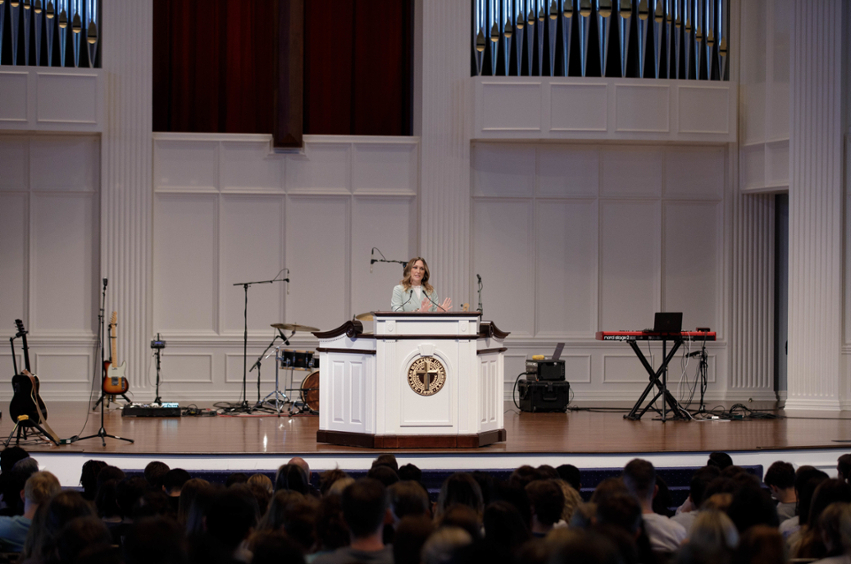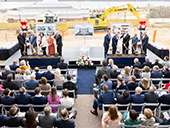Our Unwavering Hope: The Kingdom of God is at Hand
This article is over six months old and may reference former titles for DBU faculty or staff, discontinued programs, or other details that have since changed. If you have any questions, please contact us at news@dbu.edu, or (214) 333-5172.

"When he physically came down, Jesus became the intersection of where heaven met earth. And what did Jesus tell Peter to do with his sword? He told him to put it away."
On September 14th, Dallas Baptist University was blessed to welcome Dr. Katie Frugé to speak in the Wednesday morning chapel service. Dr. Frugé serves as the Director for Cultural Engagement & the Christian Life Commission at the Baptist General Convention of Texas where she oversees the efforts for Texas Baptists to lead in cultural engagement including African American Ministries, Texas Baptists in Español, Intercultural Ministries, and Chaplaincy Relations.
As she guided students through John 18, Dr. Frugé categorized the four kinds of hope believers encounter on a day-to-day basis and pointed students to the present hope found in the gospel of Christ.
Dr. Frugé began her time by telling a story about her eleven-year-old daughter, Eve. When she and her husband Lafayette told Eve they had a surprise for her, Eve wrote a narrative in her own mind that her parents were going to give her a motorized mini Jeep. After weeks of waiting and building up to what she had come to know as her "surprise day," Eve was disappointed to find that her gift was not a motorized Jeep after all. "She was so devastated for about 30 seconds," Dr. Frugé says, "until we told her 'but we packed your bag last night and we are leaving for Disney World in one hour.' That night, it was such a sweet experience to see the transformation of joy that came over her heart." As the Frugé family walked around, Eve looked up at her mom and said "Mommy, I never could have imagined when I woke up in Texas this morning that I would be playing with you in the Magic Kingdom tonight!"
Eve had made up her own narrative that she believed her parents were writing for her. But Lafeyette and Dr. Frugé had an entirely different narrative planned out for her, something totally different and so much better than her mini Jeep. "Isn't it so humbling to realize that we so often do this too?" says Dr. Frugé. "We write our own narrative, but God wants to offer us so much more."
In John 18:1-11, Judas brings a group of Roman soldiers and Pharisees to the garden to arrest Jesus. In this scene, each character or group clings to their own narrative of hope.
Judas's hope was the status quo. "Judas was greedy, vain, and empty. I would submit that on our worst days, and we all have our worst days, we are no better than Judas. We can sell out for cheap thrills, we get angry too fast or we don't get angry at the things that anger God, and we love money and the power that money provides us," Dr. Frugé explains. "When we put our hope in the status quo, we sell out for compromise after compromise."
The soldiers' and Pharisees' hope was in cultural power. "These were people who wielded their power and authority as a shield for evil," Dr. Frugé says. "We see this happen today; there are people who weaponize their authority to kill, destroy, and oppress."
Peter's hope—"Oh, Peter. We all know Peter,"—was placed in the narrative he had created about the Kingdom of God and the Messiah. Peter had read about the God of the Old Testament who slew armies and raised up mighty rulers and kings. When in the face of danger, Peter expected Jesus to pull out his weapon and smite the soldiers and Pharisees who threatened to take him away. But much like Lafayette and Dr. Frugé on "surprise day," Jesus had other plans. Jesus knew the Roman soldiers, the Pharisees, even the crowd that would shout "crucify Him!" were not the ultimate enemy. "Put your sword away, Peter," Jesus demanded.
When Jesus stepped down to earth, He brought revolutionary hope, full of redemption and restitution, and He began writing a brand new narrative, better than anything Peter or any of us could have ever imagined. "Jesus came to defeat evil itself," Dr. Frugé shares. "His death was a triumph for His Kingdom."
"In Matthew 4, we hear Jesus implore sinners to repent, for 'The Kingdom of God is at hand.' Present tense," Dr. Frugé reminds us. "The world is messed up. It's not perfect. But take heart. The Kingdom of God is real and it is at hand."
"As we read through the rest of John 18, Peter never quite grasps the narrative Christ is beginning to write," says Dr. Frugé. But when he finally got it, when it finally clicked for Peter, everything changed. Just like when Eve finally understood her parents' plan was far better than a mini Jeep, the resurrection of Christ empowered Peter to see his Savior's great plan, a Kingdom of God right here and right now. Because of this, the Lord was able to use Peter as a vessel to bring thousands to know Christ.
In closing, Dr. Frugé left DBU Patriots with two questions: "Where does your hope lie and what will you do with it?" The Kingdom of God is at hand. Place your hope in His miraculous plan and allow Him to change your heart to trust that He alone knows best.
Dr. Frugé is a graduate of Union University in Jackson, Tennessee where she obtained her Masters of Divinity and later attended Southwestern Theological Seminary where she earned her Doctorate of Philosophy in Systematic Theology. Dr. Frugé has been married to her husband Lafayette for 15 years and together the couple have three daughters, Eve (11), Felicity (8), and Noel (2).
Emmalie Ellis writes for the University Communications department at Dallas Baptist University.








